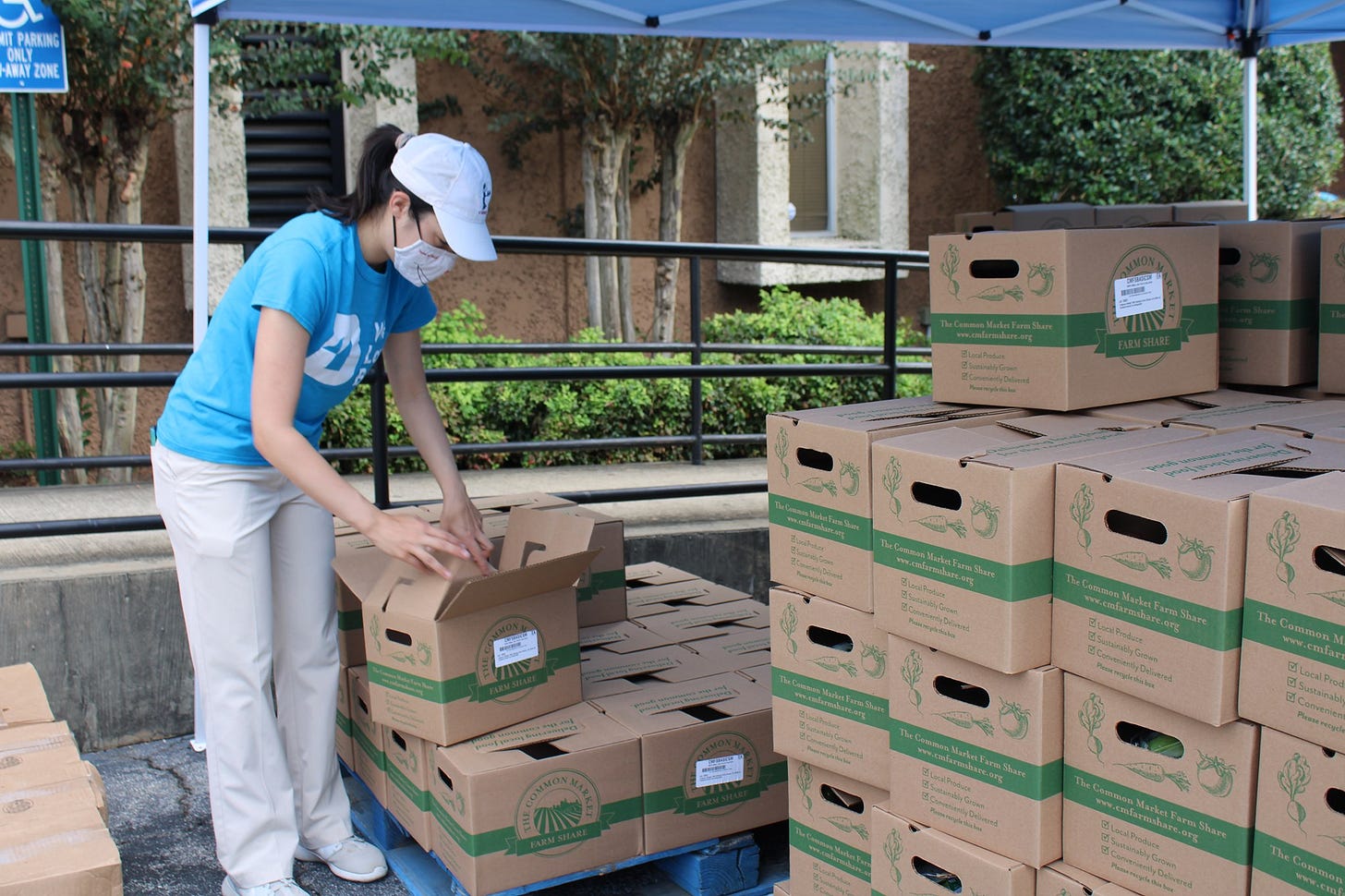Inside the fight to get food to those who need it most
Despite surplus of government funding, food insecurity persists among LatinX, undocumented communities
On an overcast Saturday morning outside the Mexican Consulate, dozens of people - mothers, fathers, toddlers, grandmothers - lined up along the side of the brick building just off I-85. A young man wearing a sky blue t-shirt at the front of the line took down each person’s information - surname, zip code, number of people in their household, how many of them were children, and took note of what the biggest needs of the family are at this moment.
After writing the information down, he gave them a ticket and directed them to a tent where boxes of food were stacked. Each person, representing one household, was given a box of fresh produce, rice, beans, corn flour, a whole chicken; and tortillas from el Milagro - a supplier on Buford Highway.
Over the course of just a few hours, 300 tickets were handed out. Each food box feeds a family of four for a week and a half.
The event, part of Feeding Families of Buford Highway, aims to reach Spanish-speaking families living along Buford Highway, many of them undocumented.
“The majority of our constituents are undocumented immigrants. Back in 2020, when food giving started happening, there were certain credentials needed like drivers licenses or IDs. That quickly turned away a lot of people,” said Lily Pabian, executive director of the non-profit that’s been organizing these food drives, We Love Buford Highway.
So Pabian partnered up with other local organizers and started delivering meals to families, no questions asked. After a few months of meal deliveries they switched to providing food staples. “People have their own recipes,” she said.
Well into 2021, despite an influx of government cash in the state, food insecurity, persists.
Before the pandemic, 13 percent of people in Georgia were food insecure, higher than the national average of 12 percent. Since COVID, the Atlanta Community Food Bank, the largest food distribution organization in the area, has seen a 300 percent increase in inquiries from people about finding food.
“The need is not going to go away. With the cost of food going up, (eviction) moratoriums expiring, it’s always that trade off...you’re trying to figure out, if I can get some assistance with food, perhaps I can reserve those funds to pay my rent, or pay my electric bill,” said Pabian.
Pabian says larger organizations like the Atlanta Community Food Bank and United Way have gotten better about outreach to immigrant communities, “there’s been a lot of learning about serving these communities...everyone is looking at barriers and access and really trying to peel them off.”
And yet, barriers continue to exist on multiple fronts.
At a food event last summer, Pabian says people turned away when they spotted police cars, “they (the police) were there to help move traffic, but we actually asked them if they could step outside and not be in the area. And immediately, people started coming back.”
On Saturday, it happened again. A cop drove up to the consulate and parked behind a tree about 50 feet from the line for food tickets. Pabian spoke to the cop, explaining that they were trying to feed families and that the cop’s presence was scaring people. She said the cop responded saying she was required to stay for a little while because the spot was part of her route. But the damage was done. “People slowed down, and then drove off,” said Pabian later.
Transportation can be another barrier.
300 people received food tickets on Saturday, but the parking lot was relatively empty. “A lot of people don’t have a car because they can’t have a driver's license. Some people will take a taxi and get food for three families,” said Alina Lee, a Board Member with We Love Buford Highway.
The organization rotates their food events at different locations to make sure they’re reaching as many people as possible, “Just a few miles can make a difference on whether a family can make it or not.”
And lack of language accessibility can often be the most obvious roadblock to people getting the help they need. “A lot of times you look at public serving websites and their google translate function isn’t working, and no one’s keeping up with it. Or they’ll send things out, and adding language is a second or third thought,” said Pabian.
We Love Buford Highway staffs each event with multiple bilingual volunteers. “It’s really about making connections so that we’re trusted...and so people know that they’re coming to us for assistance, that it’s more than just a transactional thing.”
That sense of community - the commitment to each other - was evident outside the Mexican consulate.
Fabio Cebollas, an elderly man wearing an orange t-shirt, was one of the taxi drivers who showed up on Saturday. He wasn’t carrying any passengers - he had come to pick up food for three families living along Buford Highway who had COVID.
Before loading the trunk of his car with the boxes of food, he stopped to speak to a young girl who was crying. He patted her head and spoke softly to her until the tears finally stopped.
“He’s like that, he helps everyone,” said Aceli Zenil, a volunteer with one of the partner organizations, Los Vecinos de Buford Highway.




